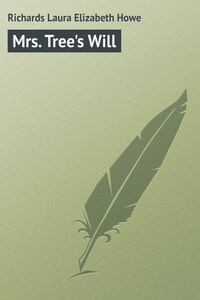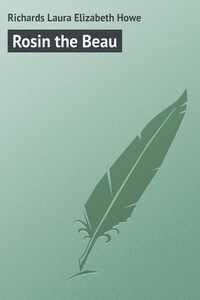"Suppose you tell me all about it, Mr. Hollopeter!" said Mr. Bliss.
Mr. Homer Hollopeter sighed deeply; wiped his brow with a sky-blue article, evidently under the impression that it was a pocket-handkerchief; sighed again yet more deeply on perceiving that it was a necktie; put it back in his pocket, and looked plaintively at the minister.
"I should be pleased to do so, Mr. Bliss," he said. "It would be – a relief; a – an unburdening; an – outlet to imprisoned nature."
"You see," the little minister went on soothingly, "our dear old friend's death occurring while I was away, and I returning only just in time for the funeral, I have not really heard the particulars yet. I might – that is – Mrs. Weight kindly called on me last evening, probably with a view to giving me some information, but I was unable to see her, and I should prefer to hear from you how it all happened."
"Yes – a – yes!" said Mr. Homer, nervously. "Mrs. Weight is a – a person – a – in short, she is a person not connected with the family. Well, Mr. Bliss, the end came very suddenly; very suddenly indeed. It was a great shock; a great – blow; a great – unsettling of the equilibrium of daily life. The village has never known such a sensation, sir, never."
"Mrs. Tree died in the evening, I believe?" said Mr. Bliss.
"At nine o'clock, sir," said Mr. Homer. "Jocko, the parrot, had had some trifling indisposition, and Cousin Marcia had sent for Miss Penelope Pardon, who, as you are doubtless aware, has some knowledge of the feathered tribes and their peculiar ailments. It chanced that I came in to bring a letter, which would, I fancied, give Cousin Marcia singular pleasure. It was from little Vesta – I would say from Mrs. Geoffrey Strong, Mr. Bliss: she has always been a favorite niece – grandniece, I should say, of Mrs. Tree. I found my cousin somewhat excited; she was speaking to Miss Pardon with emphasis, and, as I entered, she struck the floor with her stick and said: 'Cat's foot! don't tell me! folderol!' and other expressions of that nature, as was her custom when moved. Seeing me, she turned upon me with some abruptness and addressed me in the following words: 'Well, Homer, here you are mooning about as usual. You ought to be in a cage, and have Penny to take care of you. How would you like this for a cage?' She waved her stick round the room, and then, grasping it nervously, shook it at me with violence.
"'Homer Hollopeter,' she said, 'what is the name of this village?'
"Somewhat startled at this outburst, I repeated her remark. 'The name, Cousin Marcia?'
"'The name!' she said, violently. 'The real name! out with it, ninnyhammer!'
"I replied firmly, – it is a point on which I have always felt strongly, Mr. Bliss, – 'The real name of this village, Cousin Marcia, is Quahaug.'
"Mrs. Tree sat bolt upright in her chair. 'Homer Hollopeter,' she said, 'you have some sense, after all! Hooray for Quahaug!'
"Mr. Bliss, they were her last words. She sat looking at me, erect, vivacious, the very picture of life; and the next instant the stick dropped from her hand. She was gone, sir. The spirit had – departed; – a – removed itself; – a – winged its way to the empyrean."
He paused, half-drew out the blue necktie, then replaced it hurriedly.
"It was a great shock," he said; "I shall never be the same man again, never! Miss Pardon was most kind and attentive. She supplied me with – a – volatile salts, and in other ways ministered to my outer man till I was somewhat restored; but the inner man, sir, the – a – rainbow-hued spirit, as the poet has it, is – a – bruised; is – a – battered; is – a – marked with the impress of a grievous blow. At my age I can hardly hope to recover the equilibrium which – "
"Come! come! Mr. Hollopeter," said the little minister; "you must not be despondent. Consider, our dear old friend had rounded out her century; the ripe fruit dropped quietly from the bough. It is true that her loss is a grievous one to all our community."
"It is, sir! it is, sir!" said Mr. Homer. "To imagine this community without Cousin Marcia is to imagine the hive without its queen; the – a – flock without its leader; the – a – finny tribe – but this is not a metaphor which can be pursued, Mr. Bliss; and, indeed, I see our friends even now approaching to join in the ceremony – a – the – I may say solemnity, which we have come hither to observe."
The foregoing conversation was held in Mrs. Tree's parlor. I say Mrs. Tree's, advisedly, for, though the bright, energetic spirit that had so lately held sway there was gone, her presence still remained to fill the room. Indeed, this room, with its dim antique richness, its glimmer of gold lacquer, its soft duskiness of brocade and damask, its treasures of rare and precious woods, and, above all, its fragrance of sandalwood and roses, had always seemed the fit and perfect setting for the ancient jewel it held. To the poetic imagination of Mr. Homer Hollopeter, Mrs. Tree had always seemed out of place elsewhere. He had almost grudged the occasions, rare of late years, when she went abroad in her camel's-hair shawl and her great velvet bonnet. There seemed no reason why she should ever stir from her high-backed chair of carved ebony. He saw her in it at this moment, almost as plainly as he had seen her three days ago; the tiny satin-clad figure, erect, alert, the little hands resting on the ebony crutch-stick, the eyes darting black fire, the lips uttering pungent words that bit like cayenne pepper, yet were wholesome in their biting, – was it possible that she was no longer there? Mr. Homer had feared his cousin Marcia more than any earthly thing, but still he had loved her sincerely; and now the tears were in his mild blue eyes as he turned from this vision of her to greet the incoming guests. Since the death of Doctor Stedman and his dear wife the year before, Mr. Homer was Mrs. Tree's only kinsman living in the village, and Doctor Strong, now staying at the Blyth house with his wife, had begged him to take up his quarters at Mrs. Tree's for the present. He had a special reason for asking it, he said. Mr. Homer would find out later what it was. So, meekly and sadly, Mr. Homer had brought a limp carpet-bag, and asked Direxia Hawkes, the old servant, to put him wherever it would be least inconvenient; and the old woman, half-blind with weeping, had fiercely made ready the best bedroom, and was trying with bitter energy to feed him to death.














